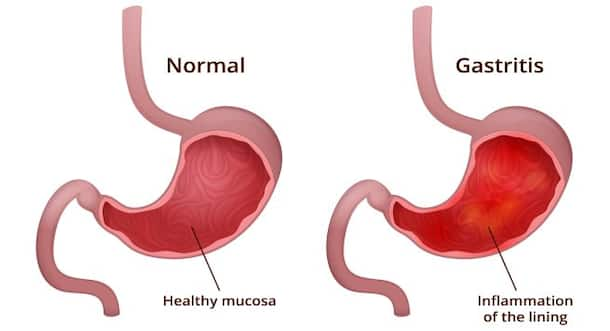Are you suffering from recurring stomach upset, indigestion, bloating or vomiting? There’s a good reason you shouldn’t ignore it. You could be suffering from gastritis. Your stomach wall is lined with cells that are differentiated to produce more acid and to secrete certain enzymes that help in breakdown of food you eat. In gastritis, this cell lining (mucosa) gets inflamed and swollen. As a result, the stomach is unable to produce the required amount of acids and enzymes to carry out digestion. This inflammation can either last for a short while (acute gastritis) or may continue to affect your digestive system for a long time (chronic gastritis).
Causes
Dr Nisha Kapoor, senior consultant gastroenterology, Rockland Hospital Qutub says, ‘Gastritis maybe caused by various factors. Some of them include:
- Stomach infection caused by the microorganism Helicobacter Pylori
- Alcohol
- Smoking
- Eating spicy, sour or fried foods
- Excessive consumption of coffee
- Antibiotics and other medications
Risk Factors
Risk factors of gastritis include stress and obesity. A person who has had a past gastrointestinal surgery is also at risk of developing the condition. Besides, some diseases like zollinger Ellison disease in which there is an increase in stomach acid production and reduction of protective factors like mucin or bicarbonates can also increase the risk of gastritis,’ says Dr Nisha.
Symptoms
With acute gastritis you may not experience any severe symptoms. But some common symptoms include:
- Pain in the upper abdomen
- Nausea
- Vomiting
- Indigestion
- Bloating
- Loss of appetite
- Blood in the vomit or stool
Diagnosis
‘Gastritis can be diagnosed by clinical signs and symptoms and by upper gastrointestinal (GI) endoscopy,’ says Dr Nisha.
Your doctor will first conduct physical examination and then may recommend you to take these tests:
- Blood test: A blood test can help in identifying whether your gastritis is due to H.pylori infection. Other screening for red blood cells and anemia can also help in diagnosing complicated cases.
- Stool test: A stool test is done when the patient complains about stool in the blood. It’s a sign of bleeding of the lining due to inflammation.
- Endoscopy: Endoscopy is a diagnostic procedure where a thin tube attached to a camera is inserted inside the stomach through the mouth to analyse the lining of stomach.It is a better way of diagnosis because the extent of inflammation can be visualized.
Treatment
Treatment is dependent on the cause of gastritis. Sometimes over-the-counter drugs like antacids may relieve some symptoms of the condition. Here are some other ways to treat the condition as discussed by Dr Nisha:
- Avoiding the diet which causes it (above mentioned triggers)
- Taking acid suppressant medications
- Avoiding stress
‘The course of medications and lifestyle changes again depend on the severity of gastritis. If the condition is caused by
H.pylori infection, then an antibiotic course is prescribed,’ she adds.
Read more about causes, symptoms, diagnosis and treatment of
acidity.
Complications
According to Dr Nisha, gastritis in general does not pose a life risk though it has an effect on quality of life. ‘If the condition persists for a longer time or if it is left untreated then it can lead to gastric cancer or iron deficiency. If the condition becomes severe it can cause bleeding from the stomach lesions,’ she says.
Prevention
Dr Nisha says, ‘Gastritis can be prevented and the best way to prevent the condition is by maintaining a good lifestyle.’ Here are some changes she recommends:
- Eat healthy food
- Avoid smoking and alcohol
- Drink water from a pure source
- Exercise to prevent obesity
‘If you have persistent symptoms in spite of adequate therapy you must get an upper GI endoscopy done to investigate the condition,’ she concludes.
The content has been verified by Dr Nisha Kapoor, senior consultant gastroenterology, Rockland Hospital Qutub.
More From Gastritis
While the possibility of a non-surgical treatment for appendicitis is good news for sufferers, it is crucial to spot the signs of this condition early on, so that it is not left untreated for long
The major reasons behind bloating and gas formation are eating and drinking. Here in this article, we have mentioned some diet tips that will prevent you from developing gas problems.
The next time you feel acidic, make these small changes and get rid of acidity in the long run.
Researchers from RMIT, Australia have developed an ingestible capsule that can accurately diagnose a variety of gut related issues through a non-invasive procedure.
Dr Roy Patankar tells us how to tackle tummy problems during monsoons.
Do you burp or belch often? Then, read this
Just inhaling these scents can prevent you from vomiting.
Embarrassingly for us, India is worse than Pakistan when it comes to sanitation!
ISIS threatens to poison food as part of terror attack on Kumbh Mela and Thrissur Pooram - here are some food safety tips you should follow at fairs and festivals.
Here are 6 ways to keep common infections at bay this monsoon.
Do not ignore these 6 common signs and symptoms of gastritis.
If you suffer from recurring stomach aches, vomiting or nausea, you should read this article, as you could be suffering from gastritis.
Suffering from bad stomach pain? You could be suffering from peptic ulcer.
While the possibility of a non-surgical treatment for appendicitis is good news for sufferers, it is crucial to spot the signs of this condition early on, so that it is not left untreated for long
The major reasons behind bloating and gas formation are eating and drinking. Here in this article, we have mentioned some diet tips that will prevent you from developing gas problems.
The next time you feel acidic, make these small changes and get rid of acidity in the long run.
Researchers from RMIT, Australia have developed an ingestible capsule that can accurately diagnose a variety of gut related issues through a non-invasive procedure.
Dr Roy Patankar tells us how to tackle tummy problems during monsoons.
Do you burp or belch often? Then, read this
Just inhaling these scents can prevent you from vomiting.
Embarrassingly for us, India is worse than Pakistan when it comes to sanitation!
ISIS threatens to poison food as part of terror attack on Kumbh Mela and Thrissur Pooram - here are some food safety tips you should follow at fairs and festivals.
Here are 6 ways to keep common infections at bay this monsoon.
If you suffer from recurring stomach aches, vomiting or nausea, you should read this article, as you could be suffering from gastritis.
Suffering from bad stomach pain? You could be suffering from peptic ulcer.
Do not ignore these 6 common signs and symptoms of gastritis.

















